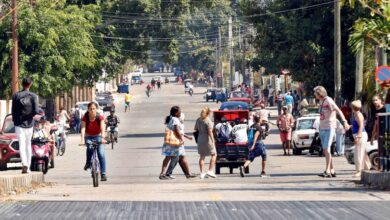Soft Skills Enhance Job Opportunities
In times of crisis, a need is seen in the business sector, to have in its work teams trained people to face the conjuncture moments from that human sense and contribute with a critical spirit to the changes that are generated.

The Woman Post | Ivonne Ortiz Ruiz
Listen to this article
In a globalized world, mediated by events that sometimes escape common sense and factors that imply a rethinking within the traditional, a questioning is born in the corporate sphere that implies analyzing the essence of human capital in its condition to face the "storms of the day to day”, when understanding that it is not enough only with answers based on the assigned functions, but with views that are developed in the exercise of young professionals taking as a reference their experiences, being active social actors and in the capacity of reflection on what happens.
This has been determined by the World Economic Forum, which on its official page records how a third of what has been considered basic skills in a person is not assumed as a priority in academic training, especially because in accordance with the progress of the Fourth Industrial Revolution, it is stipulated that employers will demand a greater combination of these skills, taking as a point of reference those aimed at critical attitude, conflict resolution, interpersonal relationships, leadership, fostering creativity and innovative processes to occupy the different vacancies.
Previous research by the Deloitte organization highlights that in this ever-evolving new era, future professionals must establish themselves as “a workforce with a broad skill mix, crucial to business success and national prosperity. Companies with qualified personnel have higher rates of innovation and productivity. Also, the academic literature has found a consistent relationship between human capital and economic growth”.
The foregoing requires determining from a reality in which young people who have been given the helm and responsibility for tomorrow are located, how they prepare for work contexts that demand great challenges on a daily basis and that today face as part of their role within society.
Santiago Gómez Mejía, Economist with postgraduate degrees in International Relations, Social Communication and Political Sciences, dean of the Faculty of Social Sciences and Arts of the Autonomous University of Bucaramanga, specifies it "by determining that, future professionals is to quickly adjust to changes in the labor market, especially to those changes derived from recent reflections on disciplinary fields that, in the case of communication, for example, are largely determined by technology and the appearance of new tools for the transmission of information.”
Also read: Carolina Angarita: Woman Who Stands Out for her Courage and Leadership
In this sense, as established by the source, the crucial point in the preparation of young people is located in aspects that correlate with the adaptation process, the prospective vision that allows timely learning and in that knowledge to transmit on the part of educational institutions, pertinently, news that impact from the social above other areas. That is why Santiago Gómez Mejía reiterates that in Social Sciences soft skills are essential, not only because of the nature of the discipline but because its execution requires interaction with other people, synergy between work teams to achieve the objectives set, and relationship with social groups, which among other aspects, corresponds to the exercise of journalists and communicators.
It is for this reason that teaching in academic settings must start from different horizons, which in lateral thinking as established by the author Edward de Bono makes it possible to analyze new paths, take risks and even explore what seems completely alien to the subject, object of study. Although the competences in young people must respond to that “hard knowledge” that forms it in its field of action, it is also essential to understand that it must be permeated and as stated by Gómez Mejía by active listening, planning, and management adequate in the face of complex phenomena, flexibility, the ability to adjust to the daily life and negotiation skills, which undoubtedly should be part of the university curriculum.
The strategy for this economist in his teaching practice and as director of the social communication program has been to assume participatory, less vertical and more horizontal methodologies of work in the classroom, surpassing the classic and traditional by spaces oriented to creative exercises and pedagogical innovation, "the main thing is to be able to meet the demands of the overwhelming change in technology and promote dialogue between subjects and objects of education through problem-based learning."
Problems that are solved based on a criterion assumed based on one's own position through practice in simulated environments where those soft skills that will be the answer to face particular circumstances in the professional lives of these generations are reinforced. That is why for those who project themselves as future members of an organization, the example and experience of their teachers will also be decisive factors in solving the dilemmas that arise.
Without going any further and according to a publication made by the World Economic Fund, regarding the pandemic, opportunities are given. This statement is based on the exploration carried out by the LinkedIn network in which it is established that young graduates, hit hard by current events, could aspire to more than 1.5 million jobs and 65,000 internships in the United States alone. Within the second period of 2020.
For Latin America and in a country like Colombia from time to time, educational institutions have become in tune, and there is more and more aware of this responsibility in the face of new generations. It is not a fad or the trend of the moment, rather it corresponds to the need to train professionals who, in search of answers, attend to the priorities of their environment and find in work performance, a joint work between education, the company, and the state.
A mirror of this is what is assumed at the Autonomous University of Bucaramanga "permanent periodic meetings with the business sector, continuous consultation with employers in the framework of accreditation processes, creation of committees to raise priorities and access to more informal dialogues for to find out about those training needs that the universities are not accounting for in their curricula,” stated Santiago Gómez Mejía.
The cards are laid out on the table; The priority is clear, training in skills that build, build, and contribute from companies to the progress of a country. That potential is in the minds of young people, in their disposition the formula to grow, and in resilience to get out of the comfort zone. Although the conjectural events are decisive, so are the tools with which adversities and situations capable of improvement are faced; all part of the two-way commitment and inspiration that increasingly move these generations to “want” and universities to strengthen a culture based on “should be”.
Contact: Santiago Gómez Mejía,Twitter: @Santiagogomezm




